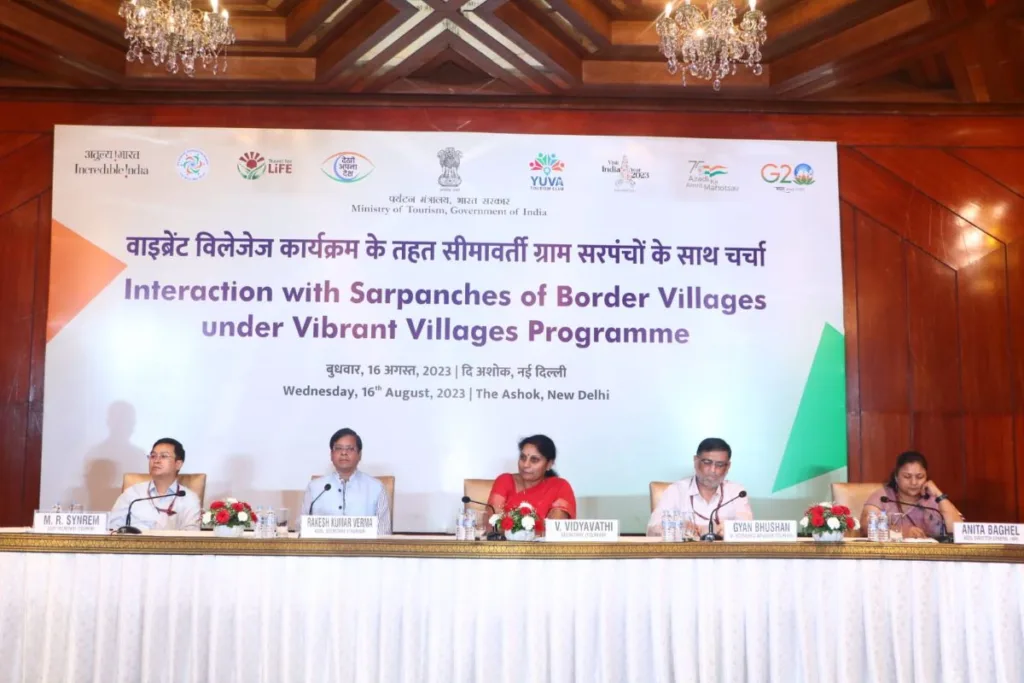Secretary of Tourism, V. Vidyavathi, orchestrated a dynamic interactive session with over three hundred Sarpanches and Gram Pradhans from Border Villages as part of the Vibrant Villages Programme. The event, held at the Ashoka Hotel in New Delhi, served as a platform for in-depth discussions on various aspects of tourism, challenges faced by these villages, and innovative solutions for sustainable tourism development.
Diverse topics were covered during the meeting, including crucial elements like infrastructure enhancement, community engagement strategies, skill development initiatives, and environmental preservation efforts.
During her address, Vidyavathi emphasized the importance of celebrating tourism festivals within the villages themselves. “We want to bring the celebrations to your villages, eliminating the need to travel to Delhi,” she affirmed. She highlighted adventure tourism as a pivotal segment for the ministry, with significant potential within the vibrant villages. Touching on the subject of sustainability, Vidyavathi stressed the need to promote tourism while ensuring the well-being of the villages remains a priority. She assured the attendees of unwavering support in their endeavors to develop their villages as remarkable tourist destinations.
Representatives from various villages shared their insights on fostering tourism in their respective areas, addressing challenges, and exploring opportunities for growth.
Pema Sherpa from Nathula, Sikkim underscored the tourism potential of the village and brought attention to critical factors such as electricity availability, road infrastructure enhancement, and skill development to foster sustainable tourism growth.
Dala Naksanga from Lahllung, Arunachal Pradesh emphasized the necessity for improved road networks, robust telecommunications, and avenues for employment generation. He also suggested establishing sports institutions to train the youth in activities like rafting and paragliding, thus broadening the spectrum of tourist attractions.
Pradeep Kumar Negi from Batseri, Himachal Pradesh advocated for responsible tourism development that preserves the indigenous identity of the villages. He recommended initiatives like cable cars and ropeways to enhance tourist experiences.
Thupstin Tsultim from Durbuk, Ladakh highlighted the significance of home stays, cultural festivals, and digital connectivity to enrich the tourist experience while preserving the cultural heritage. Dinesh Rawat from Harshil, Uttarakhand proposed the creation of winter sports facilities and crafting destinations around yoga and local crafts. He also stressed the paramount importance of raising awareness about environmental protection.
Huri Nai from Damin, Arunachal Pradesh stressed the need for land preservation and underscored the role of tourism in fostering community development. To bolster tourism in these border villages, the Ministry of Tourism is actively developing three Trans-State Mega Adventure Trails, with a special focus on areas covered under the Vibrant Villages Programme. These trails include the Western Indian Himalayan Trail, the Eastern Indian Himalayan Trail, and the Trans-Himalayan Trail.
Launched as a Centrally Sponsored Scheme, the Vibrant Villages Programme envisions comprehensive development in identified villages across 46 blocks bordering the northern regions of Arunachal Pradesh, Sikkim, Uttarakhand, Ladakh, and Himachal Pradesh.
Over 300 Sarpanches and Gram Pradhans from these regions participated in the event, reflecting the enthusiasm and commitment towards fostering sustainable tourism growth. Approved on February 15, 2023, the Vibrant Villages Programme has received a central contribution of Rs. 4800 crore for the period from FY 2022-23 to 2025-26, including Rs. 2500 crore earmarked specifically for road connectivity improvement.
